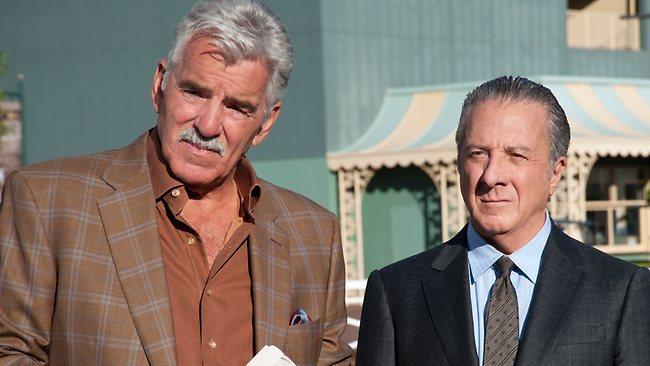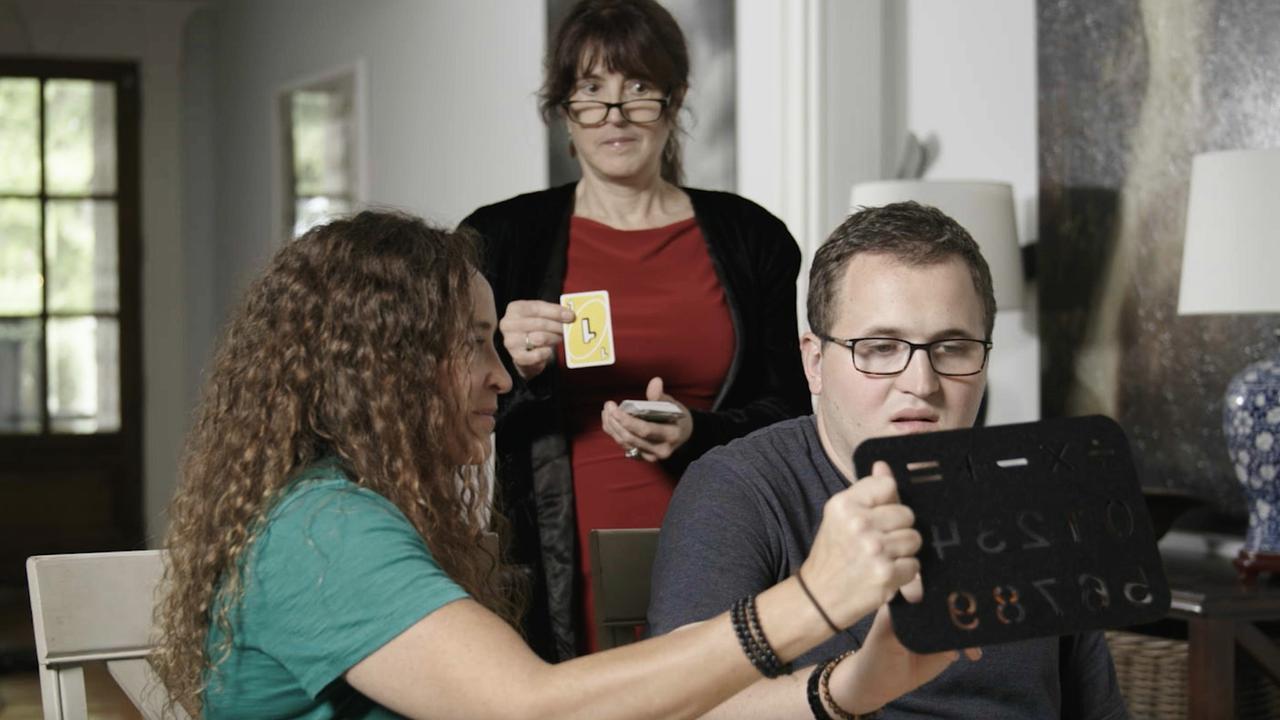Gambling on good fortune in David Milch's Luck
DAVID Milch, the man who gave us Deadwood, is back with another sprawling exploration, this time of horse racing.

COULD Luck, David Milch's new HBO series about the greatest game in the world - horse racing - be the latest "best ever" after The Sopranos, The West Wing, The Wire and Mad Men?
These were the long-form shows that enshrined the notion that TV could measure up against the best of any art form.
After only one episode Luck, which stars Dustin Hoffman and Nick Nolte, has me hooked, even if its epigrammatic storytelling, like that of an epic crime novel (think Dennis Lehane, Lars Kepler or Stieg Larsson), takes a while to gather traction.
Apparently Milch was determined to call his series Time at some point, wanting us to invest time in it, and then know that it's our world as well because we've earned entrance into it. Hoffman understood this about the show from the start. "I don't know where this character is going; don't know that much about the character and neither does everyone else, so you're learning it as you go," the veteran actor, a newcomer to TV, said in an interview with the US Television Critics Association. "I think that's very close to life; I wish I knew more about myself."
Milch, one-time head writer on the classic cop drama NYPD Blue, also gave us Deadwood, with its baroque language, abstruse profanity and rococo storytelling. Here, too, audiences needed to hang in while it explained itself. That great series reinvented the sanitised classic western of swinging saloon doors and ten-gallon hats to explore the reality of the unruly US frontier; it also took a while to get it.
In Luck - working with co-producer and director Michael Mann, who produced the visually stunning series Miami Vice and Crime Story in the 1980s - Milch takes an unflinching, and at times touchingly poetic, look at the teeming world of the California racetrack. He dramatises the compulsive search for those moments of exaltation sought by people obsessively involved in gambling, and the impact on people's lives of chance opportunities, lucky breaks and being in the right place at the right time.
It may not be as violent as Deadwood but it's just as imaginative and uncompromising, his new characters pursuing very different passions but also at the expense of rationality and even self-preservation.
Luck goes to air tomorrow in a feature-length two-episode premiere. The series begins with Hoffman's Chester "Ace" Bernstein, a professional gambler, tasting freedom after being wrongfully imprisoned and serving a three-year jail sentence. Dennis Farina's florid Gus "The Greek" Demitriou picks him up, destined to be his front man. Ace is back to stake a claim as a big cheese in the gambling world.
Not only does Demitriou act on his behalf as the "owner" of a new Irish racehorse called Pint of Plain, but Ace is also a visionary with ideas for restoring and resuscitating the sport itself. A small man in a suit now too big for him, his slicked-back hair is plastered on his head. He watches people through the holes in his skull, his face rarely moving.
We know from the start that Farina is to be Ace's confidant and quite probably his bodyguard as well. There's a kind of unstated old-style mafia quality to their relationship that Milch establishes with tart economy of dialogue. "Spare me the hat dance," Ace tells him as Demitriou fusses over him. "Just train my horse."
Ace is a man who doesn't trust anybody, and we can tell by the tight, rueful smiles he allows in the back seat of the Mercedes-Benz after he's picked up from prison, this deadpan man doesn't trust himself either. Later he says to Gus in his oddly disconcerting staccato way: "I don't trust no one, not even myself; you, I give a pass to."
We cut to the gorgeous art deco-styled Santa Anita racetrack where the many complex subplots quickly develop among the oddly languid horses and their excitable trainers and jockeys. We then segue between the stables and the luxurious hotel where Hoffman takes up residence. It's obvious we are in for a kind of Upstairs Downstairs view of how the racing industry operates, a glimpse of a parallel universe where people of all classes lose themselves as they seek fortunes. Or, if they are lucky and strike it rich, use the cash to reinvent their lives.
At the track, among the close-ups of the wonderful sleek muscular thoroughbreds with their smoking flanks and flaring wet nostrils, we meet trainer turned owner Walter "The Old Man" Smith, wheezily inhabited by a whiskery, apprehensive Nick Nolte. He is constantly staring blankly over his shoulder as if he expects to find another life off screen. He instructs his exercise girl, Rosie, played by the elfin Kerry Condon, to let his horse, Getting Up Morning, to "stretch out" fully and open up down the stretch. (Already, we are noting the plot points.)
Mann's cameras then track into the interior of Turo Escalante's stables where the heavily accented trainer, the wonderful character actor John Ortiz, watches Jo Carter (Crossing Jordan's Jill Hennessy, sultry but knowingly efficient). She's a veterinarian, examining one of his horses. She gets behind the animal about to probe and waves a gloved hand at Escalante, asking if he wishes it were him wearing the glove.
Then Escalante is annoyed by Tom Payne's apprentice jockey Leon "Bug Boy" Micheaux (any jockey who hasn't won 10 races is called a "bug") with his irritating small talk of running "big" with his horse Mon Gateau later that day.
It's hard to piece together all the narrative bits initially but already there is an alluring sense of intrigue and a strikingly elegiac romanticism as we are introduced to the behind-the-scenes machinations of the sport and its colourful characters. Suddenly a bickering foursome of degenerate gamblers scrambles noisily across the screen, played with brilliant ensemble timing by Jason Gedrick, Kevin Dunn, Ian Hart and Ritchie Coster. They pitch in to place a Pick Six bet hinging on a win later in the day by Escalante's Mon Gateau in the fourth.
There's a lot of sometimes impenetrable but colourful horse racing argot and gambling lingo, but you really need to understand only one thing to stay with the slowly unfolding, often mesmerising, first episode. For passionate gamblers the Pick Six, an accumulator bet, represents retirement money. One of the hardest bets in racing, it requires the picking of six consecutive winners on one ticket, usually the third to the eighth races of the day.
It ain't for the faint of heart but the pay-offs can be astronomical. Watching it play out in this episode is a beginner's guide to addiction, its bewildering intractability, and the particular vulnerabilities or susceptibilities of risk-takers and thrillseekers. Milch elegantly shows how our pursuit of wonder can be the thing that destroys us. He's fascinated with the passionate intensity of despondency and expectation, the two sides of luck's deadly coin.
Milch's story is really about how his characters somehow remain human as the horses take over their lives. The experiences that bring them ecstasy and wonder are the things that lead to their downfall.
It's all simply awesome, fascinating. The acting is brilliant, Milch's writing haunting, Mann's direction exhilarating, the horses marvellous, and I can't wait for more.
"IT is easy to see the beginnings of things, and harder to see the end," novelist Joan Didion once wrote. It could be an epigraph encompassing the many different meanings of Tangle, the brilliant piece of very grown-up drama entering its third season. It's another piece of long-form TV drama that deserves multiple viewings, its many layers and meanings not always immediately apparent. If you've never entered its claustrophobic world, it is so well structured that its back stories quickly resolve themselves and bring you up to speed.
Produced for pay-TV channel Showcase by John Edwards's Southern Star Productions, the series looks at two generations of two middle-class families, the Kovacs and Williamses, as they continue to unravel and occasionally tragically collide. Often at cross purposes, they blindly navigate around the maze of love, sex, money and politics, as we all do, seeking discovery and renewal.
Season two concluded with Ally Kovac (Justine Clarke) disconcerted to find her womanising late husband Vince (who was played by the brilliant and unpredictable Ben Mendelsohn) had fathered another child, Ophelia (Lucia Emmerichs). The young woman dated Max (Blake Davis), the offspring of an affair between Ally's sister, minor TV celebrity Nat (Kat Stewart), and politician Tim Williams (Joel Tobeck).
He's married to psychologist Christine (Catherine McClements), who's recently had a fling with her husband's political adviser (Don Hany) and is still a little enamoured. Vince's estranged brother, Joe (Kick Gurry), who brings with him the shadows of some seedy past shenanigans, has also entered the tangle. He's also mad about Ally.
Now, a few months on from season two, Ally has moved her family to a rambling old rental property near the sea and is working through her feelings for her husband's oldest friend, doctor Gabriel Lucus (Matt Day). Vince's children struggle to cope with their grief as they deal with the danger and the thrills of imminent adulthood. And the often unknowingly disruptive Nat (Stewart is brilliant here) asks Max, who has lived with Christine and Tim, to move in with her.
It's complex and seemingly labyrinthine at times but Tangle is created with a kind of awful clarity that makes the nerves in the back of your neck constrict as you watch. These are characters who, just like us, can never cut through the ambiguities and second starts and broken resolves that define relationships. The adult characters wear a haunting sadness as they keep discovering in their 40s that all the promises just can't be kept, that some things are in fact irrevocable and that all the mistakes, evasions and lies count after all. The children of their relationships are all grieving one way or another, gloomy and harsh in their judgments.The series, so beautifully written and acted and so fluently produced, asks the Big Question: "When does the past end and the present occur, and when does the future start?"
Luck, Sunday, 7.30pm, Showtime.
Tangle premieres Sunday, March 25, 8.30pm, Showcase.


